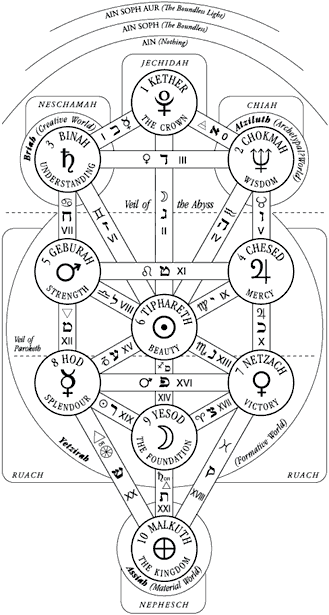Tree of Life
(Difference between revisions)
Categories: Qabalah | Tree of Life
|
Revision as of 00:27, 16 Apr 2005 Ash (Talk | contribs) |
Revision as of 16:43, 17 Apr 2005 Ash (Talk | contribs) |
||
| Line 1: | Line 1: | ||
| - | The [[sephiroth]] (singular ''sephira'') are the ten emanations or manifestations of God or the Universe. They begin with the highest aspect, [[Kether]], and as the energy or concepts pass through creation, they reach the physical world, [[Malkuth]]. Connecting many of the sephiroth are pathways, 22 in all. Within the western magical tradition, the Tree is used as a kind of conceptual filing cabinet. Each sephera and path is assigned various ideas, such as gods, cards of the [[Tarot]], astrological planets and signs, elements, etc. Within [[Thelema]], the seminal book which defines all these correspondences is ''777'' by [[Aleister Crowley]], although there have been other influential writers on the topic, including [[Israel Regardie]] and [[Eliphas Levi]]. | + | The '''Tree of Life''' is a tool used to categorize and organize various mystical concepts, and is central to the teachings of [[Aleister Crowley]] and the [[Qabalah]]. At it's most simple level, it is composed of ten spheres, or eminations, called sephiroth (sing. "sephera") which are connected by twenty two paths. The sepheroth are represented by the planets and the paths by the characters of the Hebrew alphabet, which are subdivided by the five [[elements]], the seven classical planets, and the twelve signs of the [[Zodiac]]. |
| + | |||
| + | Within the western magical tradition, the Tree is used as a kind of conceptual filing cabinet. Each sephera and path is assigned various ideas, such as gods, cards of the Tarot, astrological planets and signs, elements, etc. Within [[Thelema]], the seminal book which defines all these correspondences is ''Liber 777'' by Aleister Crowley, although there have been other influential writers on the topic, including [[Israel Regardie]] and [[Eliphas Levi]]. | ||
| ==Parts of the Tree of Life== | ==Parts of the Tree of Life== | ||
Revision as of 16:43, 17 Apr 2005
The Tree of Life is a tool used to categorize and organize various mystical concepts, and is central to the teachings of Aleister Crowley and the Qabalah. At it's most simple level, it is composed of ten spheres, or eminations, called sephiroth (sing. "sephera") which are connected by twenty two paths. The sepheroth are represented by the planets and the paths by the characters of the Hebrew alphabet, which are subdivided by the five elements, the seven classical planets, and the twelve signs of the Zodiac.
Within the western magical tradition, the Tree is used as a kind of conceptual filing cabinet. Each sephera and path is assigned various ideas, such as gods, cards of the Tarot, astrological planets and signs, elements, etc. Within Thelema, the seminal book which defines all these correspondences is Liber 777 by Aleister Crowley, although there have been other influential writers on the topic, including Israel Regardie and Eliphas Levi.
| Table of contents |
Parts of the Tree of Life
The Negative Veils
- Ain, "Nothing"
- Ain Soph, "The Boundless"
- Ain Soph Aur, "The Limitless Light"
Sephiroth (Emanations)
- Kether, "Crown"
- Chokmah, "Wisdom"
- Binah, "Understanding"
- Chesed, "Mercy"
- Geburah, "Strength"
- Tiphareth, "Beauty"
- Netzach, "Victory"
- Hod, "Splendour"
- Yesod, "The Foundation"
- Malkuth, "The Kingdom"
There is also the "false" sephiroth, Daath, or Knowledge.
The Paths
There are 22 paths that connect the ten sephiroth. They are named according to the 22 letters of the Hebrew alphabet.
- Aleph, "Ox"
- Beth, "House"
- Gimel, "Camel"
- Daleth, "Door"
- Hé, "Window"
- Vau, "Nail"
- Zain, "Sword"
- Cheth, "Fence"
- Teth, "Serpent"
- Yod, "Hand"
- Kaph, "Palm"
- Lamed, "Ox Goad"
- Mem, "Water"
- Nun, "Fish"
- Samekh, "Prop"
- Ayin, "Eye"
- Pé, "Mouth"
- Tzaddi, "Fish-Hook"
- Qoph, "Back of Head"
- Resh, "Head"
- Shin, "Tooth"
- Tau, "Cross"
- 32-bis
- 31-bis
The Veils
The Pillars
The vertical columns of the sephiroth form three "pillars":
- Boaz—the left Pillar, called Severity (Binah,Geburah, and Hod)
- Middle Pillar—the center column, called Balance (Kether, Tiphareth, Yesod, Malkuth)
- Jachin—the right Pillar, called Mercy (Chokmah, Chesed, Netzach)
The Triplicities
Above the physical world of Malkuth, there are three sets of three sephiroth:
The Four Worlds
- Briah (The Creative World)
- Atziluth (The Archetypical World)
- Yetzirah (The Formative World)
- Assiah (The Material World)
The Parts of the Soul
- Yechidah (The Self)
- Chiah (The Life Force)
- Neshama (The Intuition)
- Ruach (The Intellect)
- Nephesh (The Animal Soul)
The Correspondences
The defining feature of the Tree of Life as it's used in Thelema is the correspondences. The general idea is that all the concepts found in a sephiroth or path have essential ties with each other. Many of the correspondences are from the Jewish Kabbalistic tradition, although there are many that were added on by members of the Golden Dawn and also by Aleister Crowley. The following is a list of conceptual groupings of all the various columns found in the seminal collection of Qabalistic correspondances, Crowley's Liber 777.
- The Key Scale—not really a correspondence, but the numerical organizational tool of the Tree.
|
|
See also
![[Main Page]](http://www.thelemapedia.org/images/logo.gif)
